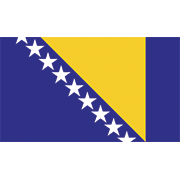General information
The changes from this regulation would include lowering the VAT rate for the supply of goods and services and the import of goods namely:
- medicines,
- flour,
- bread obtained from all types of flour,
- milk and dairy products,
- edible oils,
- edible animal fats and of plant origin,
- sugar and
- homogenized baby food.
for which a reduced VAT rate of 5% will apply.
On the other hand, the changes stipulate a higher VAT rate for:
- high-quality wines and alcoholic beverages,
- high-quality cigarettes and cigarillos,
- luxury perfumes, clothing and footwear with accessories, utensils for use and production utensils luxury vehicles, works of art, weapons and so on which are to be taxed at a higher VAT rate of 22%.
However, in order for the adopted changes to enter into force, it is necessary for it to be adopted by the House of Peoples of the Parliament of Bosnia and Herzegovina. According to current announcements is not yet clear when that could happen.
Other news from Federation of Bosnia and Herzegovina
A new consumer protection law is coming to the Federation of Bosnia and Herzegovina—what to expect?
 Federation of Bosnia and Herzegovina
Author: Tara Nedeljković
Federation of Bosnia and Herzegovina
Author: Tara Nedeljković
The Federation of Bosnia and Herzegovina is preparing to introduce its first consumer protection law, which aligns with EU standards, introduces stricter controls, bans unfair practices, and allows consumers a two-week period to return products without explanation. The law, finalized by a diverse working group, aims to enhance consumer rights, facilitate dispute resolutions, and improve market saf... Read more



New document was uploaded: Q& A from the webinar: New draft law on fiscalization in FBiH - what’s changing?
 Federation of Bosnia and Herzegovina
Author: Tara Nedeljković
Federation of Bosnia and Herzegovina
Author: Tara Nedeljković
On February 27th, 2025, Fiscal Solutions organized a free webinar on the topic of "New draft law on fiscalization in FBiH - what’s changing?". The webinar was held by Fiscal Solutions Legal Consultant Tara Nedeljković. Let’s find out more about answers to questions asked during the webinar. Read more



New document was uploaded: Recorded webinar: New draft law on fiscalization in FBiH - what’s changing?
 Federation of Bosnia and Herzegovina
Author: Tara Nedeljković
Federation of Bosnia and Herzegovina
Author: Tara Nedeljković
On February 27th, 2025, Fiscal Solutions organized a free webinar on the topic of "New draft law on fiscalization in FBiH - what’s changing?". The webinar was held by Fiscal Solutions Legal Consultant Tara Nedeljković. Let’s find out more about the fiscalization timeline, main requirements about the fiscal system in Bosnia and Hercegovina and many more. Read more



Price control measures placed on certain types of retail goods in the Federation of Bosnia and Herzegovina
 Federation of Bosnia and Herzegovina
Author: Tara Nedeljković
Federation of Bosnia and Herzegovina
Author: Tara Nedeljković
The Federation of Bosnia and Herzegovina has introduced direct price controls on 65 essential retail products to combat inflation and ensure affordability. Retailers must adhere to maximum prices for key food items, such as flour, milk, sugar, and fresh meat, while visibly displaying pricing information for consumers. Read more



New event was created: Join our free webinar: New draft law on fiscalization in FBiH - what’s changing?
 Federation of Bosnia and Herzegovina
Author: Tara Nedeljković
Federation of Bosnia and Herzegovina
Author: Tara Nedeljković
What does the Draft Law on the fiscalization of financial transactions bring? How will it impact businesses? Join us for our next webinar on February 27th at 3 PM, where Tara Nedeljković, our legal expert, will break down the latest fiscalization updates in FBiH and answer all your key questions.📅 Save the date & register now! https://fiscalsolutions.clickmeeting.com/new-draft-law-on-fiscaliz... Read more



FBiH Parliament takes another step in the fiscal reform plan with the draft law on transaction fiscalization.
 Federation of Bosnia and Herzegovina
Author: Tara Nedeljković
Federation of Bosnia and Herzegovina
Author: Tara Nedeljković
The House of Peoples of the FBiH Parliament has adopted the Draft Law on Fiscalization of Transactions, marking the first step toward implementing a comprehensive fiscal reform plan. A public discussion on the draft law will take place from February to April, followed by the finalization and adoption of the law between May and July. Read more



Federation of BiH is implementing mandatory e-invoicing and real-time reporting in the near future
 Federation of Bosnia and Herzegovina
Author: Tara Nedeljković
Federation of Bosnia and Herzegovina
Author: Tara Nedeljković
Recently, the Federation of Bosnia and Herzegovina unveiled a draft law that would require e-invoicing and real-time sales data reporting. With only a few exceptions, the Draft law's scope covers a wide range of transactions, including property transfers, sales of products and services, and many other specific activities. The Federation of Bosnia and Herzegovina has recently introduced a Draft l... Read more


